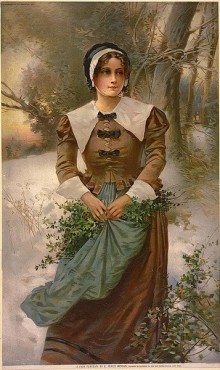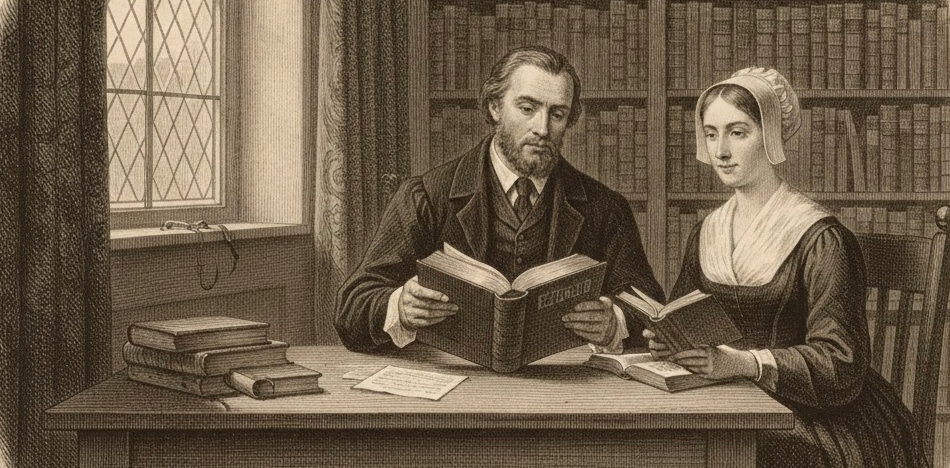 Throughout history, countless godly women have shone as beacons of inspiration. One who particularly stands out in my reading—both for her Christian intelligence and piety—is Mary Love, the wife of the 17th-century Puritan preacher Christopher Love.
Throughout history, countless godly women have shone as beacons of inspiration. One who particularly stands out in my reading—both for her Christian intelligence and piety—is Mary Love, the wife of the 17th-century Puritan preacher Christopher Love.
Christopher Love’s life ended at the age of 33 when he was executed by beheading in 1651, accused of conspiring against Oliver Cromwell, then Lord Protector of England. At the time of his death, Mary was eight months pregnant with their fifth child—their third surviving child.
On the day of his execution, Christopher Love used the scaffold as his final pulpit, delivering his last sermon and praying for his accusers. Among his last words were these: “There are but two steps between me and glory. It is but lying down upon the block that I shall ascend upon a throne. … I am changing a pulpit for a scaffold and a scaffold for a throne. … I am changing a guard of soldiers for a guard of angels which will receive and carry me into Abraham’s bosom.”
In the weeks leading up to his execution, Mary’s steadfast faith in God shone through, especially in a farewell letter she wrote to her husband while he was in prison on July 14, 1651. Reading her letter tugs at the heartstrings:
“My Dear Heart,
“Before I write a word further, I beseech thee think not that it is thy wife but a friend now that writes to thee. I hope thou hast freely given up thy wife and children to God, who hath said in Jeremiah 49:11, ‘Leave thy fatherless children, I will preserve them alive, and let thy widow trust in me.’ Thy Maker will be my husband, and a Father to thy children. O that the Lord would keep thee from having one troubled thought for thy relations! I desire freely to give thee up into thy Father’s hands, and not only look upon it as a crown of glory for thee to die for Christ, but as an honour to me, that I should have a husband to leave for Christ.
“I dare not speak to thee, nor have a thought within my own heart of my unspeakable loss, but wholly keep my eye fixed upon thy inexpressible and inconceivable gain. Thou leavest but a sinful, mortal wife to be everlastingly married to the Lord of glory. Thou leavest but children, brothers, and sisters to go to the Lord Jesus, thy eldest Brother. Thou leavest friends on earth to go to the enjoyment of saints and angels, and the spirits of just men made perfect in glory. Thou dost but leave earth for heaven and changest a prison for a palace. And if natural affections should begin to arise, I hope that spirit of grace that is within thee will quell them, knowing that all things here below are but dung and dross in comparison of those things that are above. I know thou keepest thine eye fixed on the hope of glory, which makes thy feet trample on the loss of earth.
“My dear, I know God hath not only prepared glory for thee, and thee for it, but I am persuaded that He will sweeten the way for thee to come to the enjoyment of it. When thou art putting on thy clothes that morning, O think, ‘I am putting on my wedding garments to go to be everlastingly married to my Redeemer!’
“When the messenger of death comes to thee, let him not seem dreadful to thee, but look on him as a messenger that brings thee tidings of eternal life. When thou goest up the scaffold, think (as thou saidst to me) it is but thy fiery chariot to carry thee up to thy Father’s house.
“And when thou layest down thy precious head to receive thy Father’s stroke, remember what thou saidst to me, though thy head were severed from thy body, yet in a moment thy soul should be united to thy head, the Lord Jesus, in heaven. And though it may seem something bitter, that by hands of men we are parted a little sooner than otherwise we might have been, yet let us consider that it is the decree and will of our Father, and it will not be long ere we shall enjoy one another in heaven again.
“Let us comfort one another with these sayings. Be comforted, my dear heart. It is but a little stroke and thou shalt be there where the weary shall be at rest and where the wicked shall cease from troubling. Remember that thou mayest eat thy dinner with bitter herbs, yet thou shalt have a sweet supper with Christ that night. My dear, by what I write unto thee, I do not hereby undertake to teach thee; for these comforts I have received from the Lord by thee. I will write no more, nor trouble thee any further, but commit thee into the arms of God with whom ere long thee and I shall be.
“Farewell, my dear. I shall never see thy face more, till we both behold the face of the Lord Jesus at that great day.
—Mary Love
Mary’s letter invites me to reflect on my own beliefs and to question the prevailing notions of love in today’s culture. Her love for her husband was neither self-centered nor idolatrous, but a love deeply rooted in the One who first loved us—the One who dealt the heaviest stroke of all upon His only begotten Son, whom He loves, so that whoever believes in Him should not perish but have eternal life. Rather than focusing on her imminent loss, Mary shifted her focus, and her husband’s, toward their first Love and eternal Bridegroom—the Lord Jesus Christ.
It seems especially fitting that their family name was Love.
Mary Love’s letter appears in both James Anderson’s Memorable Women of the Puritan Times (Volume One) and Don Kistler’s A Spectacle Unto God: The Life and Death of Christopher Love, both published by Soli Deo Gloria Publications.

She sounds like my beautiful wife of 58 years, a wife & multi child MOTHER holding CHRIST’S hand and mine at the same time.
Hi Robert, your comment is incredibly touching and heartwarming. It’s truly inspiring to hear about your long and loving marriage, and the beautiful image of your wife holding Christ’s hand and yours simultaneously. Thank you for sharing such a meaningful part of your life.